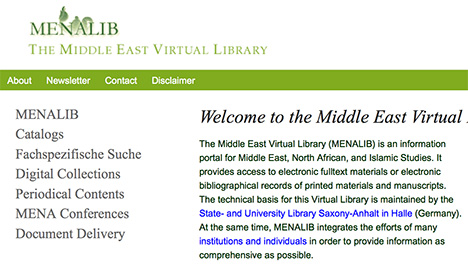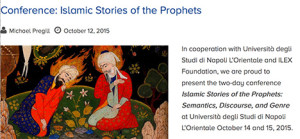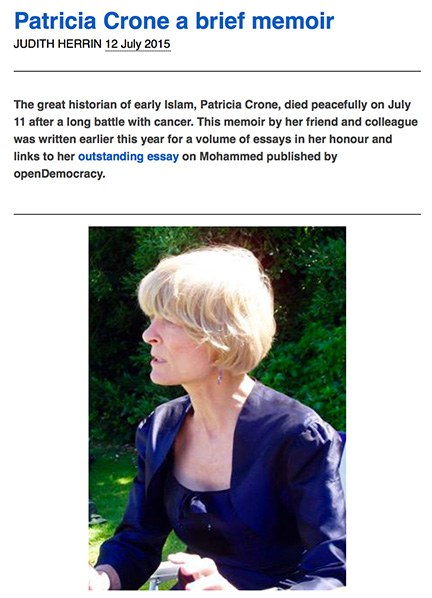MENALib is a major resource for find e-texts, manuscripts, etc.
Category Archives: Islamic Texts
Digital Islamic Humanities Project
The Digital Islamic Humanities Project at Brown University is pleased to announce its third annual conference, titled “Distant Reading and the Islamic Archive,†which will be held on Friday, October 16, 2015.
Paper abstracts and the full event program may be found on the conference website (http://islamichumanities.org/conference-2015/).
Please note that event will be live-streamed over the web. You may access the webcast beginning tomorrow morning (Friday) at 9:00 am EST.
Speakers and paper titles:
David Vishanoff, “A Customizable Exaptive “Xap†for Charting Currents of Islamic Discourse across Multiple Bibliographic and Full Text Datasetsâ€
Peter Verkinderen, José Antonio Haro Peralta, and Hannah-Lena Hagemann, “Which Muḥammad? Computer-Based Tools for the Identification of Moving Elites in the Early Islamic Empireâ€
Alexander Magidow & Yonatan Belinkov, “Digital Philology and the History of Written Arabicâ€
Elias Muhanna, “Modeling Mannerism in Classical Arabic Poetryâ€
Maxim Romanov, “al-Ḏahabī’s Monster: Dissecting a 50-Volume Arabic Chronicle-cum-Biographical Collection From the 14th Century CEâ€
Seyed Mohammad Bagher Sajadi & Mohammad Sadegh Rasooli, “Automatic Proper Names Extraction from Old Islamic Literatureâ€
Karen Pinto, “MIME and Other Digital Experimentations with Medieval Islamic Mapsâ€
Nir Shafir, “Distant Reading the Material and Bibliographic Record of the Early Modern Islamic Archiveâ€
Eric van Lit, “A Digital Approach for Production and Transmission of Knowledge in Islamic Intellectual Historyâ€
Taimoor Shahid, “Mobile Ethics: Travel and Cosmopolitanism in the Islamic Archiveâ€
Conference on Qisas al-Anbiya
For details on the conference, click here.
Jinn and Toxic
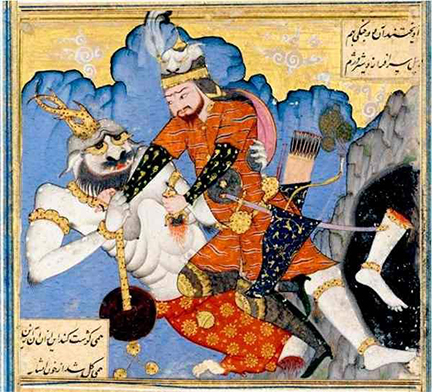
Rustam fighting a Jinn from a medieval Islamic manuscript
Anyone who has read about Aladdin knows about the genie in a lamp. The English term “genie” stems from the Arabic “jinn,” a reference to spirits in various physical forms that are said within traditional Islamic theology to have been created from fire. Artistic representations of the jinn are varied, but often show monstrous and distorted bodies. A collection of illustrations can be found online here. From our modern perch, such depictions belong to fantasy and science fiction. But literalists who seek to return to the way of thinking, although selectively, of what they think was thought at the time of the Prophet seem to believe in the jinn as part of an apocalyptic scenario for the end of the world.
While denouncing those who would walk into a bar and order gin and tonic, the extreme salafi belief in a real-life jinn is just as toxic, and not simply to one’s sobriety. I grew up in a Fundamentalist Baptist church where belief in the Devil, evil spirits and angels was prominent. It was convenient to have the Devil. a.k.a. Satan, around to explain why bad things kept happening to otherwise good people. The philosophical question of the “problem of evil” and how a just and loving God could allow such evil in the world was evaded by saying that God was allowing Satan to control the world. Life, thus, was a test and one that no one could win alone. Hence the need to put a “Jesus saves” bumper sticker on your car and condemn the “unsaved.”
There are few greater evils in the world today than belief in an unseen evil power that serves as the excuse to explain why there is so much hatred, prejudice, violence and killing. The Christian doctrine of “original sin” shifts the blame back to a naked Adam and Eve, who dared to seek the knowledge of good and evil. Islam avoids original sin, but nevertheless there have been many Muslims who justify evil in this life. Reports of ISIS fanatics who rape Yazidi women as a duty to their faith is a case in point. So is the mantra that the caliph or ruler must be obeyed, no matter how unfair, corrupt and evil he is. The old Manichean dualism of an eternal battle of good vs. evil is not only maintained, but magnified.
I wish there really were jinn and that they would show themselves so that modern day Rustam’s could battle them and conquer the fear of such beasts. It is the fear of the invisible that is the greatest fear to overcome.
Patricia Crone (1945-2015)
Library of Congress on the Near East

The Library of Congress has a very nice website with online resources regarding its collection of Near Eastern materials.
Cult-ivating ISIS
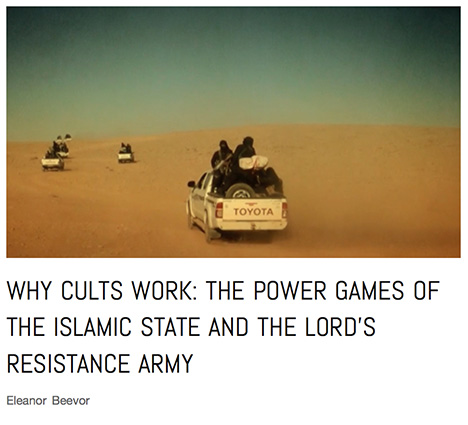
There is an excellent analysis of ISIS as a cult recently posted on War on the Rocks.
Here is the start, but click here for the full article…
Why Cults Work: The Power Games of the Islamic State and the Lord’s Resistance Army
by Eleanor Beevor
Graeme Wood’s article “What does ISIS really want?†has become the most discussed foreign policy article of the year. Yet the piece’s power lies not in the title question, but in Wood’s blunt assessment of a paradox that leaves Western leaders flummoxed: How does one explain the traction of the Islamic State in Iraq and the Levant (ISIL), while also denying its religious legitimacy, in order to combat anti-Muslim bigotry? Wood didn’t mince words in refuting this hesitancy:
The reality is that the Islamic State is Islamic. Very Islamic… the religion preached by its most ardent followers derives from coherent and even learned interpretations of Islam.
What follows is a fascinating piece of research, and a frustrating read. Despite addressing all the right aspects of ISIL’s ideological content to understand its power, Wood’s argument is guided by the wrong question: “How Islamic is ISIL?†For him, denial of ISIL’s Islamic nature is why we fail to understand it. The analytical pitfalls of quantifying “Islamic-ness†should be self-explanatory. Are some of Islam’s 1.6 billion practitioners less Muslim than others if they are less violent? How do we explain the religious devotion of politically “quietest†Salafism, compared to the British ISIL fighters who purchased Islam for Dummies pre-departure? This is not to say that religion is irrelevant in the analysis of ISIL. ISIL uses Islam as an existential anchor, so its actions have to be influenced by it in order to work. It also freely capitalizes on global Islamist sentiment. But to say the whole structure is uniquely, potently Islamic is not just a logical fallacy, but part of the very illusion that sustains loyalty to it. Actually, the features that Wood claims represent ISIL’s Islamic orthodoxy – its obsession with “purity†and the apocalyptic prophecy it stakes its claim on – have “been done,†and not just by Islamists. This is revealed by comparing ISIL with another notoriously violent army, led by another self-styled holy man.
ISIL and the Lord’s Resistance Army (LRA) represent grabs for power, but power of a cosmic kind, beyond what human society can grant them. In examining both, I suggest a word substitution. The ways in which ISIL works, to extraordinary success, are not uniquely Islamic. They are uniquely “cultic.†And to examine ISIL as a cult is to see chinks in its armor. ISIL’s territory may be shrinking, but that alone won’t kill the loyalties of its cadres, nor slow the spread of its bloody sectarian ideology. In ISIL, as in the LRA, knowledge is power. If we can challenge the leaders’ tight hold on that power, ISIL’s ideological grip on its fighters might just begin to crumble…
Symposium at Berlin State Library
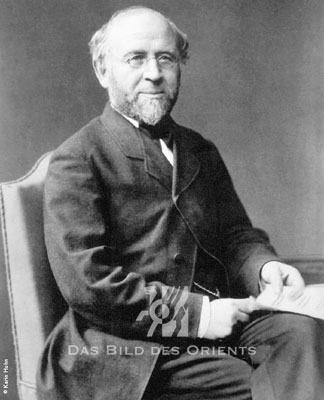
Johann Gottfried Wetzstein (1815 – 1905)
by Christoph Rauch, H-Net
Arabic manuscripts and Oriental studies: Symposium on the occasion of the 200th birthday of Johann Gottfried Wetzstein.
The international symposium “Studies on Johann Gottfried Wetzstein (1815-1905): Manuscripts, Politics and Oriental Studies†will be held at Staatsbibliothek zu Berlin from 19th to 21st February 2015. (Venue: Potsdamer Strasse 33, 10785 Berlin)
The symposium will be inaugurated Thursday, 19th February 2015, 6:00 PM with a keynote lecture by François Déroche (Paris): “The Qur’anic collections acquired by Wetzsteinâ€; and a musical-literary program by Claudia Ott and her ensemble. Furthermore, some original documents and manuscripts related to Wetzstein will be exhibited at the opening.
If you plan to attend the conference please register before 31st January at the secretary of the Oriental Department, Mrs. Muenchow, orientabt@sbb.spk-berlin.de.
The symposium is generously supported by the Fritz Thyssen-Stiftung and the Verein der Freunde der Staatsbibliothek e.V.; and is organized in cooperation with the Oriental Institute of Leipzig University.
Here is the list of contributions in alphabetical order:
Ibrahim Akel (Paris), Wetzstein in Arabic sources and remarks on some manuscripts from his collections
Kaoukab Chebaro and Samar El Mikati El Kaissi (Beirut), Manuscript ownership and readership at the American University of Beirut at the turn of the 20th century
Alba Fedeli (Cambridge), Tischendorf and the Mingana Collection: Manuscript acquisition and Qur’Änic Studies
Ludmilla Hanisch (Berlin), Semitic studies at the University of Berlin during Wetzstein’s lifetime.
Michaela Hoffmann-Ruf (Bonn), The Wetzstein collection at Tuebingen University Library – its history, its content and its reception in Oriental Studies
Ingeborg Huhn (Berlin), Some remarks concerning the official correspondence of Johann Gottfried Wetzstein
Robert Irwin (London), The Arabist and Consul in Damascus Sir Richard Burton and the problematic nature of his translation of The Thousand and One Nights
Continue reading Symposium at Berlin State Library
